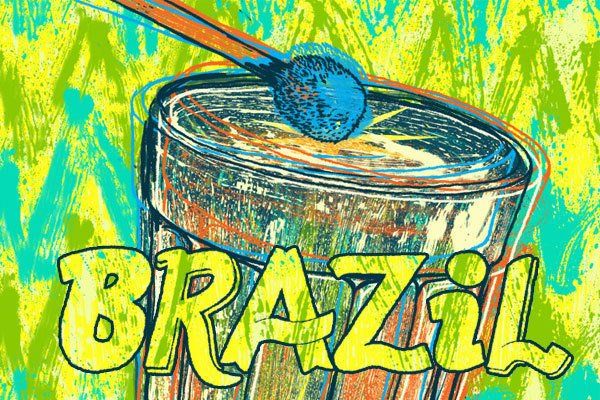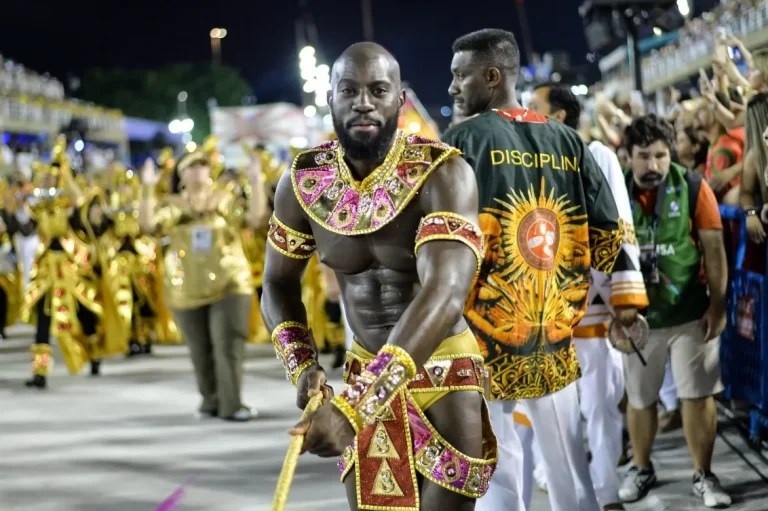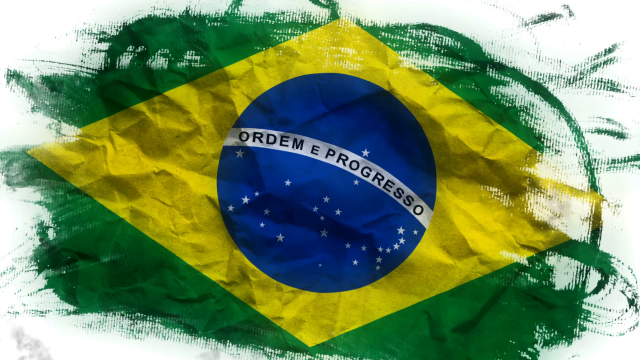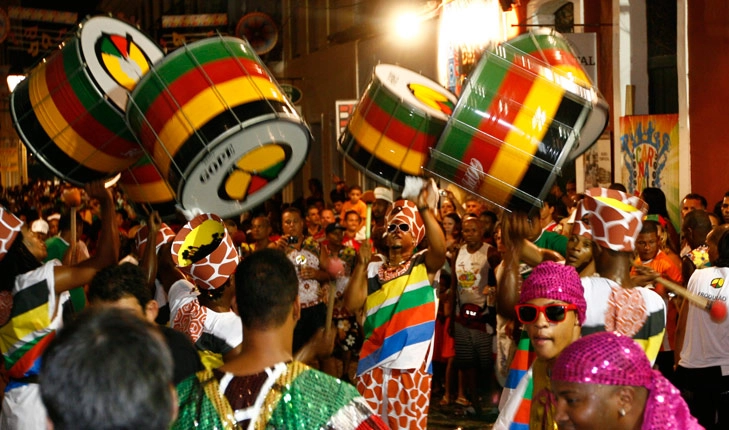
The ethos of golden age hip hop melts into Brazilian music history on Ela Partiu, the debut long player from 24 year old rapper Laiz.

Laiz left her Sau Paulo home at just 14, moving to the States then relocating to Germany in 2018. Ela Partiu was recorded in historic Hildesheim with an extended musical family passing through, identities spanning Cuba, Algeria, Brazil, Colombia, Germany, Australia, South Africa, Ivory Coast, Ghana, Sudan, Peru, USA and Madagascar.
The album is named in honour of one of Laiz’s heroes – Ela Partiu is the name of a classic Tim Maia track, the ‘70s tortured soul-boy from Rio de Janeiro. It also translates to ‘she has gone’, referring to Laiz’s early-life decision to leave her family home, unable to adapt to a life as a Jehovah’s Witness, from a city in the state of Sao Paulo.
This upbringing brought musical boundaries with it, and Laiz didn’t discover hip hop culture until she arrived in Berlin at 14. Wordplay and lyricism spoke to her heart, and she looked back to Brazil and artists such as producer Marcelo D2, who combined samba traditions with poetry.
It’s in this vein that Laiz has selected five key influences for Bonafide – sit back and discover some gems.
Hip hop is globally, an unstoppable force – which in my biased opinion- is the biggest revolutionary movement of the past 5 decades, the real MCs, a legacy from the revolutionaries who shook the world in the 60s to 80s. From Black Panthers to the Latin awakening.
Bars, they aren’t just like any other lyrics, the audacity and polemics in a well written hip hop song, the references, historical teaching and philosophical tandems hidden behind it awaken something in us that most of our teachers, priests, parents and caregivers failed on giving: blunt, indigestible, hard facts, of the world we encounter ourselves in, and how to manoeuvre it with honesty and self esteem.
Whereas hip hop started as a North American cultural movement in the Bronx, its roots are deep in Africa, and therefore, all over the world. And especially where I come from, Brazil. The country with the biggest African descendant population outside the continent, where gods, language, rhythms and cosmovision managed to hide itself throughout the history that tries to erase it.

So here are my Top 5 Hip Hop Albums which were crucial to my education (both lyrically and musically) from Brasil.
5 – Esú – Baço Exu do Blues
Maybe the best of our generation and many others, not only from Brasil, but from the ones I came across. I remember sitting with my mother and giving her printed lyrics of this album, without any music, for us to study together, so she could better understand what is this so called Hip-Hop I’m putting myself in the line for.

NIne tracks and none of them falls short of any texts from Guimarães Rosa, or Carlos Drummond de Andrade (great poets from the homeland). It feels like a cleansing of spirit from a soul stuck between oppressed gods and the hailing of a culture who might just be the answer for our nation.
Message?
Black gods are being assassinated in Brazil, both the ones in flesh, and the ones in spirit, in a fatal immortality.
4- Emicida – Pra quem já mordeu um cachorro por comida até que a gente chegou longe
Emicida keeps it in the street. Raising his ethics and morals, that are now being acclaimed worldwide, which he stills carries.
Sun Tzu has The Art of War, Emicida has, “For those who have bitten a dog for food, we’ve come a long way” – and he did. Feeding his strength for change in the misery lived by him and many other Brazilian families in a land where every seed can grow.
This album never left my side, and is always here to remind me, “when the paths get you confused, it’s necessary to come back to the beginning”. This is the first piece that opened up the path for the further construction of new horizons, through music.

Emicida is not only a warrior, he is a visionary. And this album is also here in my top 5 for for the way it was recorded, printed and sold.
The start of an empire, the “Ghost Lab” (Laboratório Fantasma) where he, his mother and brother from the inside of his home, package with craft paper and stamped by hand, the album, he sold in the streets of São Paulo, hand in hand and in a year sold ten thousand copies, winning the title of Golden Record.
I don’t think I need to say anything else. Hip Hop. A serious business of dreamers in war.
3 – Criolo – convoque seu Buda
Like a humble man, he keeps on humbling us with lyrics that remind me of those wise men you encounter in the street once in a little while that bring you a sanity of mind. His writing, simple. Not the type of simple that is small. But the type of simple, who all ears on earth can receive with a smile and a nod of head, from children to a 90 year old on his deathbed.

He just makes sense, explaining capitalism and imperialism talking about the baker and that bread you buy every morning.
Criolo is an exemplary Brazilian. Convoque seu Buda unites all his strengths, his sound is immaculate and mature. Reinventing and refining Brasilian Hip-Hop by giving a spotlight to Brazilian jazz, samba, MPB (Música popular brasileira_, reggae and boom bap. With compositions that I really wish to be the norm in our hip hop, but which are far from being common.
2 – Planet Hemp – A invasão Sagaz dos Homens Fumaça
This one is huge fun. A laugh on the face of law. A swing in the face of police and corrupt politicians. Planet Hemp was a huge voice in the struggle for legalization of weed, and against mass incarceration of the black youth in the nineties. After they were put in jail for talking about “Drugs” they came out the gates with “the clever invasion of the smoke men”, a call for cultural revolution for freedom of speech and against what they call “cultural dictatorship”. Their arrest being one of the biggest cases of censorship after the military dictatorship in 1964 in Brazil. Only 12 years after the reinstallment of democracy, the band was suffering with censorship, shows cancelled, CDs being seized from stores. Until not only their art but their bodies were put to jail, on basis of music.

After arrest, being convicted of very same thing they denounced in their lyrics. They took the bottom to strike down hypocrisy and the myth that we are a free country. The first track just put down the law for which they were arrested for. And they follow getting punkier and punkier just pretty much calling for civil disobedience, and arresting their case that we still live under dictatorship, and under American control. It’s raw, dirty. Even though I am not a fan of punk, this still comes as one of my favourite albums for the attitude and the relevant points about our political system.
Honestly, national heroes, leaving a mark on world history with an album who is the living proof. That imperialism is alive regardless of what the TV, politicians and our school says.
1- Instituto – Coleção Nacional
The debut Album of the collective Instituto. Another revolution, a complete sound journey that ties Hip Hop, Samba, Jazz and reggae together. Maybe one of the biggest and most silent seeds when it come to the introduction of instrumentation to our national Hip Hop. Experimental at its finest. Uniting different rappers and producers from the scene with Jazz musicians in an attempt to redefine Brazilian music in the 2000s. It’s bold. radical. Refreshing even today. And it is my top 1 not for the lyricism nor for its historical influence. But for one man, also the man in charge of the 3 Albums above, Daniel Ganjaman. One of the founders of instituto. In a way he reminds me of young.vishnu and instituto, the new love experience, a Brazilian version of SAULT from the 90s. A collective of musicians, who don’t tour, don’t have a specific formation, but are in ever changing transition in the forefront of what is possible within our most loved genres.

This was a playground for pushing the boundaries of what was possible. And I just have to thank these musical lovers for trying to think so ahead, I still have to look forward if I want to get what they tried to do in Coleção Nacional.





